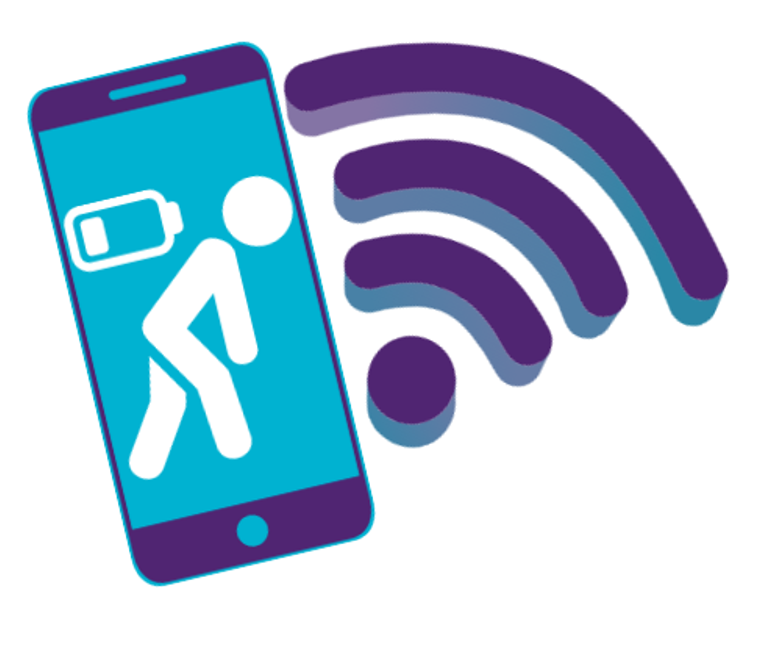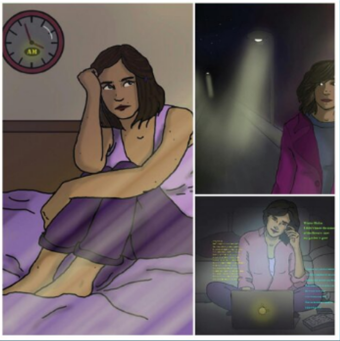Reading time: 6-8 minutes
Psychosis is when your view of reality becomes distorted in some way. During a psychotic episode, you might see or hear things that aren’t actually there (hallucinations) or believe things that aren’t true (delusions). In the moment, these may seem very real to you. You may also experience disorganised thinking or speech. This might make it difficult to focus on one thing because your thoughts are racing, or you might jumble words together or talk very quickly.
Psychosis is different for everybody. Some people might experience psychotic episodes every day, while others will only have a couple in their lifetime.
Sometimes, psychosis is a symptom of other mental health conditions, such as bipolar disorder, schizophrenia and some personality disorders. Other triggers include drug or alcohol misuse, trauma, or medications that you’re taking.
Psychotic episodes can be scary and they may affect how you interact with the world and people around you. You might feel a level of shame or embarrassment due to some of the misconceptions surrounding it. Try to remember that psychosis is never your fault and there are thousands of people who are having similar experiences to you. Psychotic episodes can be managed and there’s lots of support out there to help you cope.
What can it feel like?
Going through psychosis can impact different areas of your life, as well as your mental wellbeing. It can influence the way you act and relate to others. You may feel:
- Exhausted
- Overwhelmed
- Anxious
- Scared
- Confused
- Distrustful of people or organisations
- Paranoid or threatened
- Out of control
- Misunderstood by other people
- Frustrated that people aren’t perceiving reality in the same way as you
- Ashamed
- Guilty
Not all psychotic episodes are negative. Some people might see or hear people who bring them a lot of comfort, while others find inspiration in their experiences and say that it allows them to view the world in a different light.
Whatever you feel, there are ways to help you gain more control over your thoughts and behaviours and minimise the negative impact that psychosis might be having.
What might help?
- Explore a diagnosis. If you think you’re experiencing psychosis, it’s a good idea to talk to a GP as soon as you can. They’ll ask you a few questions and will likely refer you to a specialist. The type of specialist you see will depend on the severity of your psychotic episodes and the effect that they’re having on your life. Working with your mental health specialist, you’ll decide which forms of treatment will be most effective for you, which can include different medications and therapies. If psychosis is a symptom of an existing mental health condition, the support options may be focused around treating that.
- Talk to people! Psychosis might feel quite scary at times, but opening up to people around you might make you feel better. It also lets them know what they might expect during a psychotic episode and what you think might help, allowing them to offer support in a way that feels comfortable to you.
- Join a support group. People who haven’t experienced psychosis probably won’t know exactly what you’re going through, so it can be comforting to speak with people who do. Joining a support group allows you to share and listen to experiences and make you feel a bit less alone. You can ask your GP or mental health specialist to point you in the direction of support groups. We’ve also listed a few in the Support section below.
- Keep a diary. Recording how you’re feeling (both physically and mentally) and any things that are going on in your life can help you to identify patterns. You might find that some situations trigger psychotic episodes, or that your behaviour changes in the days leading up to one. This knowledge can help you to prepare and minimise risk to yourself by trying out positive coping strategies or asking for support.
- Practice relaxation techniques. You might find that stress and anxiety trigger your psychosis or influence its severity. Using some relaxation techniques can make you feel calmer on a day-to-day basis and boost your general mood. You can find a list of tips on our stress and anxiety page
- Take care of your physical health. Happy body, happy mind! Ok, it’s not quite that simple, but looking after your physical health can have a huge impact on your mental health too. Ensuring that you’re getting enough sleep, drinking enough water and getting some light exercise can make a big difference. See our physical health page for more tips on maintaining a healthy lifestyle.
Where to go for more support
Psychosis can make you feel frightened, confused or even judged, but it doesn’t have to be that way. There’s a variety of support options and resources available for people living with psychosis, from general advice to local support groups. You might find something that really helps you.
- Please remember that if you’re ever feeling desperate or think that you might hurt yourself, you can visit any A+E for immediate support.
- Hearing Voices Network provides information, support and empowerment to individuals who experience hallucinations or delusions. They also run many support groups across the UK, which you can search for using their support group finder
- Check out Bipolar UK if you have bipolar disorder and are experiencing psychosis as a symptom. They offer support and resources to those affected by the disorder, as well as a support group for young people aged 18-25
- Mind has lots of useful information on psychosis, including tips for self-care and a breakdown of possible treatments. There’s also a support section for family members, friends and carers
- Rethink Mental Illness explains psychosis in more detail and covers topics such as potential causes, different types of treatment, and advice for family and friends. They’ve compressed all of this information into a downloadable factsheet, which may come in useful both for yourself and those around you. They also run their own support groups, which give people who are struggling with mental illness the opportunity to talk about their experiences in a safe space.
- Time to Change has lots of blogs and stories from people who have experienced or are living with psychosis.
- YoungMinds has more information about psychosis. Their free Crisis Messenger service is also available 24/7 if you’d like to chat to someone about what you’re going through via text.
- Call Samaritans on 116 123 if things are getting too much for you or you’d just like to talk to someone. You can also send them an email at jo@samaritans.org.
- Chat to 42nd Street While we can’t offer specialist support for psychosis, our services allow you to talk about your feelings, help you to understand your behaviours and develop positive coping strategies. We provide a number of services, both online and face-to-face, which offer something slightly different depending on what you want to get out of the support. Overall, though, every service provides you with someone who will listen, acknowledge your feelings, and work with you to develop ways of making life more manageable. You can read about our services here.
Articles could also be interested in:










































































